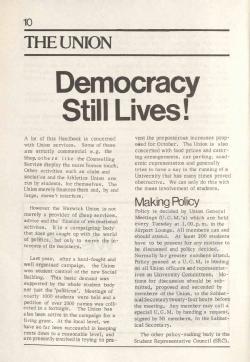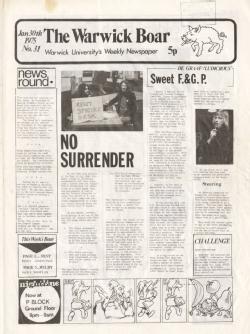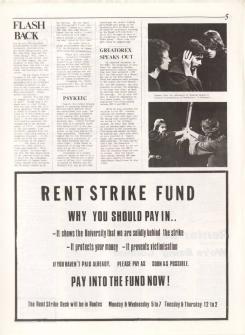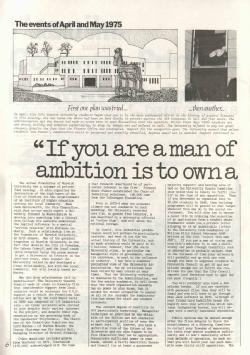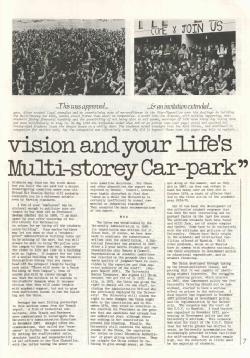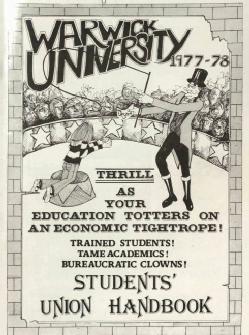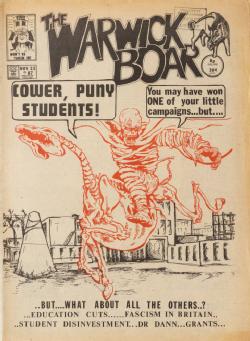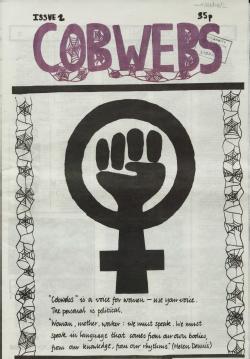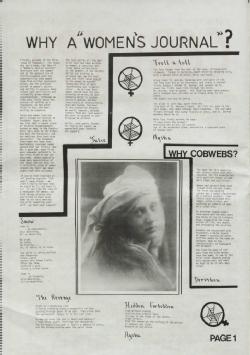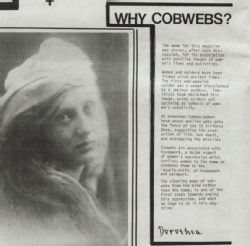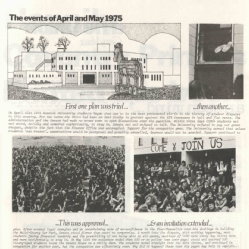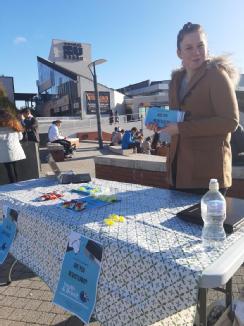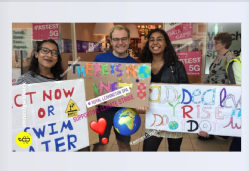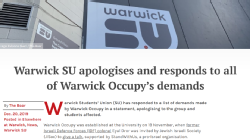Student Politics
In our research, we attempted to gauge how political Warwick’s students are and whether this has fluctuated in the past. From our interviews, it was clear that most students, alumni and even professors believed that Warwick students had been very politically active closer to the founding of the university but also, that there is recent evidence pointing toward a similar trend. The mass occupation of the University Senate House in 1975 that only ended with police intervention, serves witness to this, and can be compared to the Occupy Warwick movement in 2019 where students occupied 3 rooms in the Warwick SU HQ for 30 days over allegations of growing racism within the SU itself.
Before
I had arrived (1971), there
had been a protest of the so-called “secret files” that actually
spread around the country. Certainly the 1975 protest was a
particularly big one and of
course, it was centred around the subject of rents because there had
been very high inflation and student rents were put up in line with
that inflation, which wasn’t too popular with the students.
Ultimately, the
protest was ended by a massive police occupation of the Senate House
which was then the new centre of the university.”
Wyn
Grant, Emeritus Professor
In the early noughties, our investigation suggests that student politics went through a period of stagnation. Karen Parker describes her opinion of this when she began her bachelor's degree in 2000.
When
I started in 2000, I
was quite surprised because I expected the students to be a bit more
politically aware and a bit more pro-active.
I thought it was a bit sad, really, that they all seemed a bit boring
and kept their heads down and did their work; and might
have complained quietly to each other but not on mass.
I found that quite interesting because then again, when I would have
gone to university at a traditional time, that would have been the
late 1970’s, it was a very political time. Having said that, in
the last 4 or 5 years there have been political protests on campus,
and I’ve been quite encouraged that there is actually debate and
thorough process gone into it. It was quite interesting in the latest
General Election it became quite clear that the university straddles
two constituencies. I thought the dynamic between the two
constituencies was quite interesting and students were more engaged
with the issues.”
Karen
Parker, Alumni and Gallery Assistant at the Mead Gallery
Although, in present times, Warwick students demonstrate a high level of engagement with SU politics, Ellie King describes the “military operation” in running an SU campaign for the Post-Graduate Officer role in 2018 which she went on to win. And within the SU itself, Andrew gives us his account of tediously long debates lasting until 11 o’clock in the evening. The last, All Student Vote (ASV) in 2020 received record turnout according to the Warwick SU, all pointing towards a politically engaged student body today.
If
you’re really involved in the SU, it’s like a military operation.
Mine was a solid 3-4 weeks of work, pretty full-time, of doing the
campaign. It’s like: write
manifesto, get people to help, sort out your paints, get everything
designed, sort out your lecture shout-outs schedule.
But then, when it comes to the week, the week starts really early.
You’re allowed to campaign from 9 AM but I turned up on campus at
5:30
AM, which is quite a common
thing. People do get there earlier. So, you get up and go reserve
spots and make sure everything’s okay. That bit is quite stressful,
getting everyone organised. Luckily,
I had a campaign manager who dealt with all of that.
A lot of unis do it differently. Firstly, we contain our campaigns to one week, which is quite unusual. I think a lot of unis do a thing where as soon as your nomination is in, you can start campaigning so ours becomes a really intense block of 5 days. The second big difference is that we’re a campus and quite an enclosed campus. I think it also depends on what the union is like. Unions officially started in 1994. It was an education act that said something like “universities need to have student unions” and some universities already had student unions like Warwick. Which means we fought to get it whereas universities that hadn’t had it and got it, the relationship between the university and the union was different and it wasn’t as ‘activist’.” Ellie King, Joint Oxford and Warwick PhD candidate (Image of Ellie in front of her SU election campaign poster)
One
of my memories is again with RAW
and student journalism. This
was back in the day when, most, there were, students did vote online
but the SU constitution still obliged that there had to be meetings
in person, of various bodies. I can remember in the Maths and Stats
building those sort of huge lecture theatres that they have, being
present there and a
very divisive debate about the SU boycotting Barcardi and replacing
it with another brand of rum,
because of the links between the Bacardi family and sort of support
for various insurrectionist groups against the government of Cuba.
I am glad they got rid of the system, cause it was very time consuming. I mean the meeting started at 7pm and it only dissolved at about half 11…. And the evening just sort of ended in farce, cause someone tabled a motion that the meeting should cease because we were no longer quorate and then there was a debate on this and then they took a count of people in the room and they found that we were quorate by only 1 person. It was then put to the vote whether the meeting should be abandoned, the meeting actually voted to continue the meeting but then the person who tabled the vote realised [that] if we were only one person quorate, then if he left we would no longer be quorate. So, then we had to wrap up the meeting anyway.
I think that the Bacardi one was particularly divisive, and I know at that meeting there was lots of sports execs that had basically given their members a three line whip to come, mostly to vote against. But that’s kind of the main big one that I can remember. I mean and actually it’s a testament that to me the biggest single demonstration of kind of student bodies on campus I had ever seen was last year over the group chat incident. When there was that, you know, brilliant demonstration that kind of filed down Library Road and at the time, I was there, and I just remember looking at all those and I think I was fairly nearish to the front, I just remember looking back and seeing all those people kind of occupying that space and thinking to myself WOW, in 10 years I have never seen quite as many people before.” Andrew, French and History, 2009-2013

